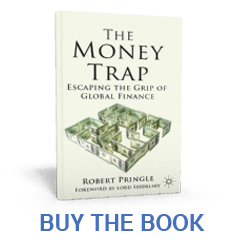Globalisation – a poisoned chalice
Globalisation will triumph but bring many new problems with it
Against such a backdrop, financial globalisation appears to be a weak force.
Yet it exists. It exists in many senses. Nations may raise capital controls – though surprisingly few actually have done. But there are ways round them. People’s desire to connect to the major centres of finance where the opportunities and investment chances are focussed are likely to overcome such barriers. The number of currencies with any claims to be independent is decreasing. And there is a global currency shadowing them all – the US dollar.Thus central banks around the world orient their currencies and monetary policies in greater or lesser extent by reference to the dollar. We remain on a dollar standard. It may be seen as a trap or a blessing, but it exists.
The roots of the dollar’s role go deep – it is precisely because the dollar is demanded for so many different motives, and dollars are transmutable quickly into such a wide variety of alternative means of exchange and purchasing power that its liquidity remains unquestioned. But more important, as and when the dollar declines it is likely to be succeeded by another global measure of purchasing power and store of value.
Many observers predict the emergence of a “multi-polar” reserve currency system. That is not much of a prediction, as it is in many ways already here.
But I do not believe it will be anything other than a relatively short transitional phase. Once the dollar loses its ascendancy – in my book I argues it is being slowly undermined by US monetary policies and US impatience with its inability to devalue, it will be succeeded by another universal monetary standard. The economies of scale are too great – the advantages in a world of global markets of having a common unit of account, store of value and means of exchange are likely to be overwhelming.
The new globalisation is rooted in the opportunities available to individuals from the opening up of monetized markets. Governments will attempt to retain control, as we have seen; yet individuals pressure will brush these aside, just as they do the attempts to censor the internet.(Maybe however, thee will be one exception- where individuals are forbidden from accessing markets or the internet on religious grounds and subject to a faith-based policing).
The financial crisis is likely to prove a harbinger of many more crises. They are an intrinsic part of global financial markets, which are not at all self-stabilising. That is one form of “externality” – their vulnerability to sudden breakdowns (which will often be due to the debt cycle). Another kind of externality is comparable to environmental pollution – the gradual, insidious damage done by the use by billions of people of products that are useful to the individual but when consumed by millions, harmful. When everything has a price, when global money sustains global markets in every good and service imaginable (and many that are yet to be imagined) then “corporatist” values are likely to spread globally – notably materialism and short-termism.
As economist and Nobel Prizewinner Edmund Phelps has noted, “there is now a growing fixation on becoming rich”. Statistics show that people save even in their retirement. In a swipe at Thomas Piketty, he argues that it is materialism, deep in western societies, more than ‘capitalism’, or tax laws, that has brought abnormal wealth inequality since 1970 and also resulted in loss of dynamism and economic stagnation.
Thus financial globalisation will in the end prevail, forcing governments to give up monetary autonomy, and to submit to common global currency arrangements. Whether these result from organic evolution or explicit governmental cooperation is an open question.
But this does not mean the monetary unification of the world will be a force for good. On the contrary, unless an adequate global policy framework is put in place, it is likely to be marked by periodic catastrophes and long-term cultural pollution.

